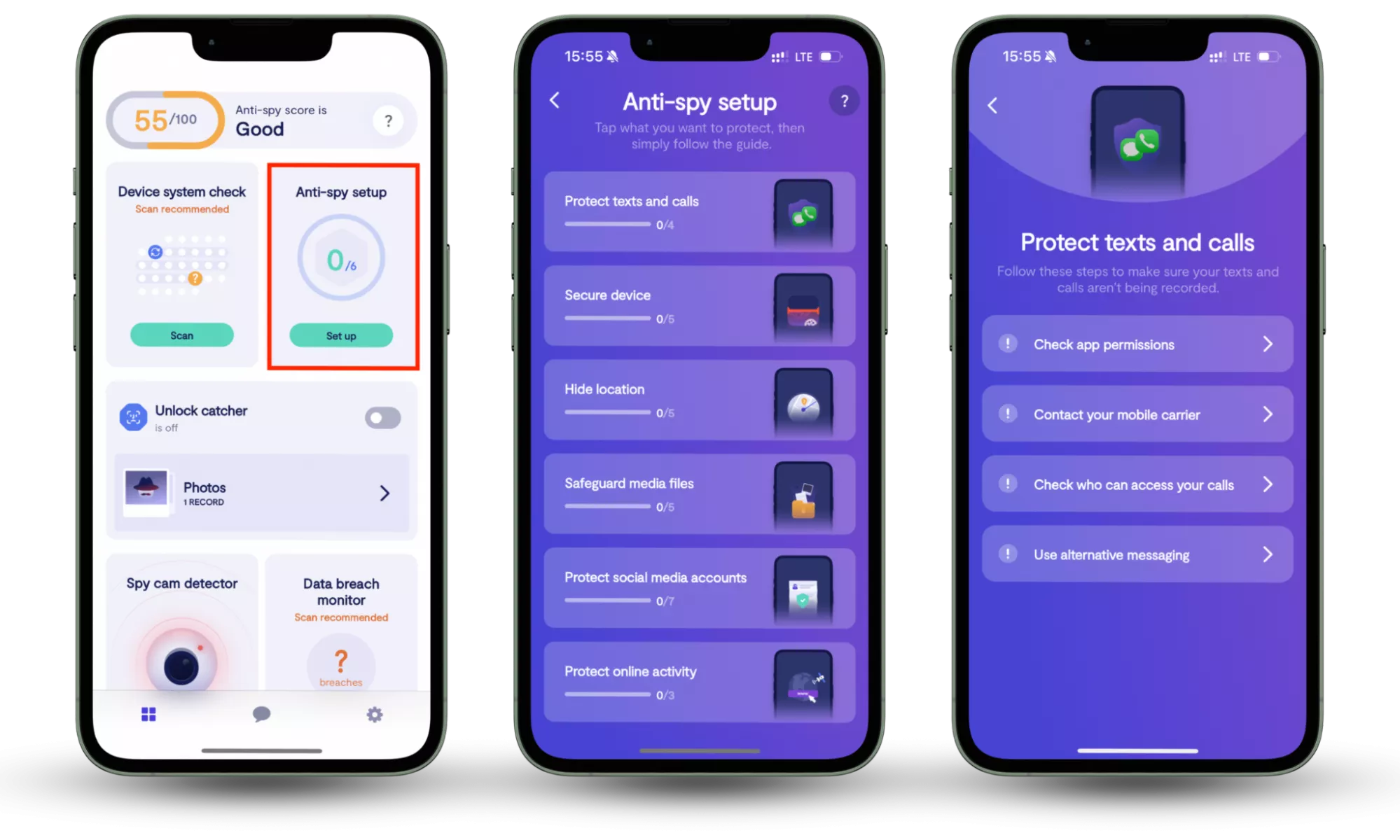Table of contents
- Should you get revenge on scammers?
- The scale of modern scam operations
- How to get revenge
- Keeping scammers at bay
- Modern threat coverage
- Conslusion
One option that has been gaining in popularity is getting revenge on the scammers, turning the tables on them, and looking for ways to annoy them and waste their time. Kitboga is a popular Twitch and YouTube streamer who has gained following streaming his efforts to get back at scammers.
While high-profile scambaiters like Kitboga demonstrate that scam engagement can be entertaining and educational, their activities are typically supported by cybersecurity knowledge, anonymization tools, and legal awareness that most everyday users do not have. For the average person, attempting similar tactics without safeguards can expose personal data, increase scam targeting, or escalate harassment.
Should you get revenge on scammers?
The biggest question to ask is whether you should even try to get revenge on scammers. Sure, getting revenge is a tempting option, and one that would likely bring a large amount of satisfaction. Unfortunately, the reality doesn’t always match up with the expectation.
One of the biggest risks you face when trying to get revenge is opening yourself up to even more scam attempts and harassment. Quite often, when a scammer sends an email, they don’t know for sure if the recipient email address is live. Many times, scammers will simply send out a mass email to a whole list of addresses, not knowing which ones are active. Replying to such an email will let the scammer know your email address is active, and could lead to even more scam attempts.
The problem can be even worse if the scammer manages to get your phone number. Suddenly, what started as an annoying email can turn into a barrage of harassing phone calls.
Another concern is the legality of trying to turn the tables on a scammer. Some jurisdictions are beginning to enact strict privacy laws. Trying to get revenge on a scammer, especially if that revenge involves flooding the spammer’s inbox with retaliatory emails, could land you on the wrong side of the law.
Explainer (cybersecurity perspective)
From a cybersecurity standpoint, engaging directly with scammers—even as a joke—can unintentionally increase your digital risk. Scammers frequently share lists of “responsive” emails and phone numbers, and any reply may confirm that your contact details are active and valuable. In some cases, engagement is used to fingerprint victims by language, time zone, or behavioral patterns, which can lead to more targeted attacks.
The scale of modern scam operations
Many online scams are no longer run by isolated individuals but by organized groups using automation, scripts, and rotating infrastructure. These operations can contact thousands of potential victims daily, making individual revenge efforts largely symbolic. Consumer protection agencies consistently report billions in annual losses from scams, with phishing and impersonation scams among the fastest-growing categories. This scale is why prevention and reporting are generally more effective than retaliation.
How to get revenge
If you are determined to get revenge on a scammer, there are a few legal revenge tactics.
| Action type | What it involves | Risk level | Why it works |
| Ignoring scammers | Not replying, blocking senders, avoiding interaction | Very low | Prevents confirmation that your email or number is active |
| Reporting scams | Submitting reports to consumer protection authorities | Very low | Helps disrupt large-scale scam operations over time |
| Scambaiting (carefully) | Engaging scammers without sharing personal data | Medium | Wastes scammer time but requires strong privacy precautions |
| Anti-spam chatbots | Using automated tools to engage scammers | Low to medium | Limits direct exposure while wasting scammer resources |
| Device & privacy protection | Locking down privacy settings and reducing spyware exposure | Very low | Cuts off data scammers rely on for targeted attacks |
With these considerations in mind, the following options outline legal and practical ways to respond to scammers—ranging from completely avoiding engagement to carefully controlled methods that prioritize your privacy and security.
- Ignore:
The most obvious way is simply to ignore the scammer. A scammer’s goal is to make money by duping people into falling for their scam. The best way to get revenge is by not falling for it, ensuring that any time spent on you is time wasted.
- Scambaiting:
You can try to engage the scammer, emailing them back and pretending to play along with whatever scam they’ve concocted. Because you’re simply replying to an email the scammer sent you, there is little to no chance of getting into any legal trouble. Many individuals, such as Kitboga above, specialize in scambaiting and have made a profession of it.
If you choose to go down this route, you may want to use a dummy email account when pretending to play along. This would make it much harder for a scammer to link you to your actual email, minimizing the chance of any fallout. If the scammer does retaliate by flooding your dummy email account, simply close it and start over with a new one.
Additional safety tip
Never click links, download files, or open attachments sent by scammers—even when scambaiting. Files and links may contain tracking elements or malware designed to extract device information such as IP address, operating system, or browser details. Experienced scambaiters avoid interacting with any external content for this reason.
- Join Forces With Others: There are a number of online communities, such as 419eater.com, that specialize in helping scambaiters collaborate, warn each other and team up to scambait the scammers.
Pro tip
When participating in scambaiting communities, it’s important to follow established guidelines and avoid actions that could be interpreted as harassment, impersonation, or coordinated abuse. Reputable communities emphasize education, awareness, and safe engagement rather than aggressive retaliation.
- Use an Anti-Spam Chatbot:
For the ultimate in revenge, you can enlist a service that specializes in wasting scammers’ time. For example Re:scam is an email chatbot designed to do just that. Re:scam took emails that have been sent to it and replies to the scammers, attempting to keep them engaged as long as possible. Because Re:scam is run by a cybersecurity firm, it’s reasonably safe, from a legal perspective. The chatbot is currently offline, being reworked and receiving upgrades, but should be available again soon.
Spamnesty is another chatbot that will try to engage spammers, wasting their time. Spamnesty strips out your email address to protect your identity and privacy, then sends you a link to the conversation so you can watch it unfold and relish in some scammer payback.
Editorial update
Scambaiting bots and automated reply services may become unavailable or change functionality over time due to legal, ethical, or operational constraints. Before using any automated tool, verify that the service is active, transparent about data handling, and compliant with applicable privacy and anti-harassment laws in your jurisdiction.
- Report Scams to the Authorities:
Report any attempted scams or fraud to the FTC. While the FTC will not be able to do anything in many cases, there may be some instances where they are in a position to take action. Reporting scams gives them the information they need to build a case.
Even when individual reports do not result in immediate action, aggregated reports help authorities identify large-scale scam patterns, shut down infrastructure, and issue public warnings. Over time, this data contributes to enforcement actions and improved consumer protections.
Keeping scammers at bay
Like many professions, scammers try to spend their time where it will count the most. As a result, the best thing you can do is to proactively protect yourself from scams and avoid being a tempting target.
Carefully avoid clicking on links in emails, or opening attachments, especially from addresses or companies you don’t normally correspond with. You might also consider using a couple of different email addresses, each one with a dedicated purpose. For example, you may use one email address for mailing lists, one for shopping accounts and receipts and another for personal communication. This can make it easy to keep things compartmentalized and identify scam emails when they’re sent to the wrong account.
Similarly, never provide your username and password to someone, whether it be via email or over the phone. No reputable company should ever ask for your username or password.
When browsing online, be sure the website address is spelled correctly, and not a closely spelled spoof of the website you’re trying to visit.
A few practical measures can go a long way toward protecting you from scams and preventing you from needing to get back at scammers in the first place.
It’s natural to feel anger or frustration after being targeted by a scam, especially when time, money, or personal information is involved. However, effective recovery focuses on regaining control through protection and prevention rather than confrontation. Channeling that energy into securing accounts and reporting scams often leads to better long-term outcomes.
Modern threat coverage
Scam attempts increasingly extend beyond email to SMS messages, phone calls, social media platforms, and messaging apps. Enabling multi-factor authentication (MFA), using a password manager for unique credentials, and monitoring for data breaches can significantly reduce the impact of these attacks. Awareness across all communication channels is now essential.
In addition to account security measures, reducing exposure to spyware and hidden tracking tools is an increasingly important part of scam prevention. Spyware can monitor browsing activity, intercept messages, or collect personal data that scammers later exploit for highly targeted attacks. Tools like Clario Anti Spy help users identify risky privacy settings and walk through a guided anti-spy setup checklist, making it easier to lock down devices, limit app permissions, and reduce data leakage. This proactive approach helps close the gaps scammers often rely on long before a scam attempt reaches your inbox or phone.
Here is how to use Clario Anti Spy’s Anti-Spy setup feature:
- Download Clario Anti Spy, create an account, and sign in.
- Under the Anti-Spy setup section, select Set up.
- Follow the step-by-step recommendations to review privacy settings, restrict unnecessary app permissions, and reduce your device’s exposure to spyware and hidden tracking tools. This helps limit the data scammers can access and lowers the risk of targeted attacks.

Conslusion
Getting revenge on scammers may feel empowering, but for most people it creates more risk than results. Responding or engaging can expose active contact details, invite further harassment, or escalate into legal trouble. A safer and more effective approach is prevention—blocking, reporting, and reducing the personal data scammers rely on. Strengthening privacy settings, limiting app permissions, and minimizing spyware exposure with tools like Clario Anti Spy helps cut off access to your data at the source. By focusing on protection instead of retaliation, you reduce future scam attempts and regain control without putting yourself at risk.
Read more:


